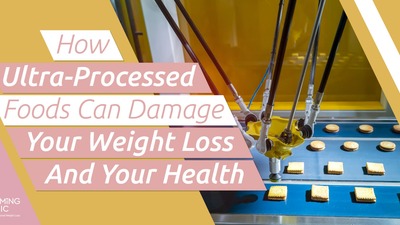Is The Menopause Making You Gain Weight?
October 18th every year is world menopause day. The day is held to raise awareness of the menopause and the health conditions that can accompany this natural stage of a women’s life. For a lot of patients that we see who are entering the menopause, they have come to us because they have started seeing their weight increase and can’t seem to control it. It is a common fact that a lot of women gain weight when they enter the menopause, and it is estimated that you can gain approximately 5lbs during this stage of your life. However, if you are already carrying excess weight, you may find that you gain a lot more weight when you are going through the menopause. We want to assure you that menopause weight gain doesn’t have to be an inevitability. Whether you are perimenopausal, in the menopause or postmenopausal, we hope that this blog will show you a little more about how you can look after yourself and either lose, or prevent excess weight gain with some helpful weight loss and health tips.
Stages and Symptoms of the Menopause
Depending on your stage of menopause, there will be varying symptoms that you may experience. There are 3 stages of the menopause:Perimenopausal
At this stage, you will notice that your cycles become irregular, but will not have stopped completely. You may experience some symptoms associated with the menopause, but you will not have yet entered the menopause.Menopausal
This stage is when you no longer have a menstrual period as your ovaries have stopped releasing eggs and producing oestrogen. This stage is usually diagnosed when you have had a full 12 months without a period.Postmenopausal
A woman becomes postmenopausal when you have not had a period for over 12 months and symptoms that are associated with the menopause start to ease. The length of each stage will vary for each woman. The length of perimenopause is approximately 4 years, but some women may experience this stage for more or less time.Symptoms
When you are entering the menopause, you may get some, or all, of these symptoms:- Hot flushes
- Night sweats
- Difficultly sleeping
- Reduced libido
- Problems with your memory or concentration
- Headaches
- Mood changes – anxiety or low mood
- Heart palpitations
- Joint pains, aches or stiffness
- Reduced muscle mass
- Recurring UTIs
- Weight gain
Reasons the Menopause Causes Weight Gain
Menopause weight gain affects so many women because of the drop in oestrogen levels. Our fluctuating hormone levels can affect the way that our bodies are storing fat and the way our body manages food can also change during menopause, meaning we burn less calories than we did pre-menopause. The weight we gain during menopause also doesn’t distribute across our bodies in the same way that it did before either. Where pre-menopause, your weight would more-or-less evenly distribute across our whole body, when we enter the menopause, our weight tends to gather around the middle as visceral fat, and crucially, around our vital organs, which can prove to be dangerous. Additionally, our bodies require less energy, but we don’t tend to reduce our food intake and once we have hit the menopause, there is an inclination to move less as our joints and muscles become more prone to aches and fatigue – all adding up to weight gain!What Can You Do To 'Beat' The Menopause Weight Gain?
We know that menopausal weight gain can have negative impact on your health and can increase your risk of breathing issues, heart disease, stroke, certain cancers and type 2 diabetes. Whilst there is no one-size-fits-all approach to maintaining a healthy weight in menopause and beyond, there are some simple ways that we can try and stay in good health and within our healthy BMI range.Eat smaller portions
Once you are in, or have been through, the menopause, you require much less energy / calories, so by reducing our portion sizes, we can help stop some of the weight gain we might see.Eat a balanced, healthy diet
Make sure that you are getting at least 5 portions of fruit and vegetables a day and that your meals are nutritious and healthy. Avoid takeaways too frequently and switch to low-sugar or sugar-less drinks.Watch your alcohol intake
Alcohol is full of empty calories and can add hundreds of calories to your diet each time you have a glass of wine. Limiting the amount of alcohol you drink will help halt too much weight gain.Keep moving
It can be really tempting to reduce your exercise when your muscles and joints ache more, but keeping up your activity not only helps with your weight loss, but your mobility too. It also helps where we might experience a reduction in muscle mass during menopause, to keep your muscle density high.Keep stress levels low
This is easier said than done in a lot of cases, but stress releases the hormone cortisol, which can lead to more abdominal fat deposits. During high stress times, we can also turn to food for comfort and find ourselves falling into unhealthy habits again. Where needed, talk to those who can help reduce your stress levels to keep you healthy. If you, or anyone you know, is suffering with symptoms or menopause weight gain, get in touch with us at The Slimming Clinic. Because our online weight loss programmes are delivered by doctors, we know how to look after your health and how to approach your weight loss, no matter what stage in life you are at. Give us a call to speak to a member of staff about your symptoms and the goals you want to achieve with your health, or book a call back for a more convenient time for you! Related posts

Nutrition and Hydration Week: How Food & Hydration Aid Weight Loss

How Sleep Affects Weight Loss – World Sleep Day 2025

Ramadan Weight Loss Guide: Balancing Fasting with Weight Loss Medications

12 Christmas Weight Loss Tips

Weight Loss Motivation: Stay Inspired to Achieve Your Goals

How Ultra-Processed Foods Can Damage Your Weight Loss And Your Health
Looking to start your weight loss journey, then take action today!
Book an appointment with one of our GMC-Registered Doctors who are weight loss experts and can ensure you get the best programme for you. Alternatively request your medication online using our online prescription service.


